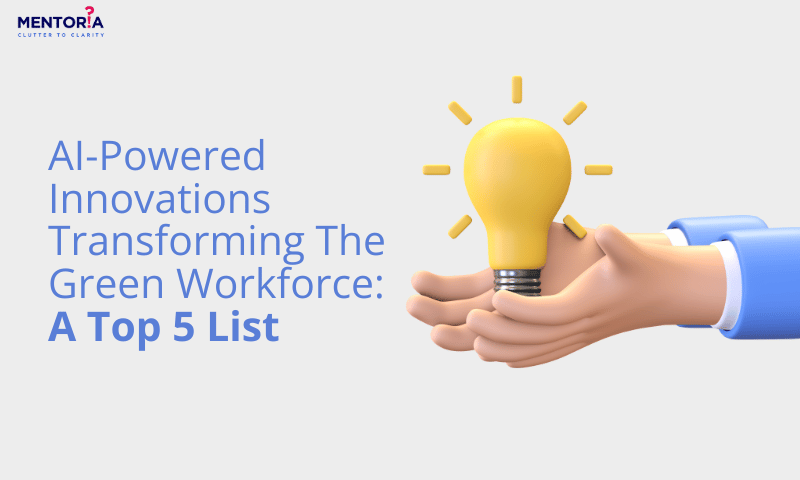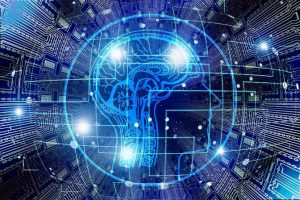5 AI-Powered Innovations Transforming The Green Workforce

Ever wondered how the world is going green, and how you can be a part of this cool eco-friendly wave without hugging trees or wearing a cape? Well, guess what? The answer lies in the fantastic world of AI. That’s right, artificial intelligence is not just about robots and sci-fi anymore. It’s your ticket to becoming an eco-warrior, all while sipping your morning coffee. Artificial Intelligence, or AI for short, has swiftly become more than just a buzzword. It’s not just for sci-fi movies or tech geeks; it’s for all of us who care about the environment. Imagine a world where AI works hand in hand with us to protect our planet. Well, that world is closer than you think!
Smart Buildings: Energy Efficiency Reinvented
You might have heard about smart homes, but have you ever considered the wonders of smart buildings? AI is revolutionising the way we use and conserve energy in commercial spaces. Here’s how:
- Real-Time Energy Optimisation: Imagine a building that can predict its energy consumption and adjust settings in real time to minimise waste. With AI, smart buildings can analyse data from sensors and weather forecasts to optimise heating, cooling, and lighting, reducing energy bills and carbon footprints.
- Predictive Maintenance: AI-powered systems can predict when equipment like HVAC units or elevators are likely to fail. This allows for timely maintenance, preventing costly breakdowns and minimising energy wastage.
- Indoor Air Quality: AI is a silent guardian of your well-being in smart buildings. It continuously checks the indoor air quality, adjusting ventilation systems as needed. Whether it’s a packed conference room or a quiet office, the system ensures that the air you breathe is clean and healthy, promoting a more productive and comfortable workspace.
Green Data Centers: Sustainable Computing Power
Data centres are the backbone of our digital world, but they come at a considerable energy cost. Here’s how AI is now being used to make these data hubs more eco-friendly:
- Energy-Efficient Cooling: AI algorithms optimise the cooling systems in data centres. By analysing temperature data and adjusting cooling equipment in real time, AI reduces energy consumption while keeping servers at the ideal operating temperature. It’s like having an energy-conscious guardian for your data.
- Renewable Energy Integration: Data centres are increasingly integrating renewable energy sources, like solar and wind, into their operations. AI plays a crucial role here too, predicting when these sources will be most productive. It ensures that data centres switch to green energy during peak production hours, contributing to a greener grid.
- Data Traffic Routing: AI’s influence extends even to the way data travels across the internet. By selecting the most energy-efficient paths for data transmission, AI minimises energy requirements. This eco-friendly routing ensures that your online activities have a lighter carbon footprint.
Green Transportation: AI-Powered Electric Vehicles (EVs)
Electric vehicles (EVs) are a huge step towards reducing carbon emissions, but AI is making them even more efficient:
- Range Prediction: AI algorithms analyse various factors, such as driving habits and weather conditions, to predict the range of an EV more accurately. This helps users plan their trips and reduce “range anxiety.”
- Charging Optimisation: AI can suggest the best times to charge your EV when energy rates are lower or when your power comes from renewable sources.
- Self-Driving EVs: The future of transportation includes self-driving EVs. AI enables these vehicles to find the most energy-efficient routes and even drive in a style that conserves energy.
Smart Agriculture: AI For Sustainable Farming
AI isn’t just for cities; it’s also working wonders in agriculture to make farming more efficient and environmentally friendly:
- Precision Farming: Smart agriculture harnesses the power of AI to fine-tune the farming process. Drones and sensors collect data about soil conditions, weather, and crop health. AI analyses this information to determine the precise amount of water, fertiliser, and pesticides needed for each crop. The result? Reduced waste and a more environmentally friendly approach to farming.
- Crop Health Monitoring: AI is like a vigilant guardian for crops. It can identify early signs of plant diseases and pest infestations. This early detection allows farmers to target interventions more precisely, reducing the need for broad-spectrum pesticides and promoting sustainable agriculture.
- Autonomous Farm Equipment: Self-driving tractors and harvesters guided by AI are becoming commonplace in modern agriculture. These autonomous machines are not only highly efficient but also environmentally friendly. They reduce fuel consumption, optimise planting and harvesting, and ensure that every inch of the field is used effectively.
Waste Management: AI-Powered Recycling
Waste management has always been a pressing global concern, with overflowing landfills and contamination issues becoming increasingly problematic. However, in this age of technological advancement, AI-powered trash sorting robots have emerged as a remarkable solution to tackle this colossal challenge. These ingenious machines, equipped with cutting-edge AI technology, are transforming the way we handle and process our waste. Here’s how they do it:
- Advanced Sensing Technology: These robots are armed with an array of sensors, such as cameras and infrared detectors, which enable them to identify different types of waste materials. The AI algorithm processes the data from these sensors to make informed decisions.
- Real-time Decision Making: Thanks to their AI brains, these robots can make real-time decisions about where each piece of waste should be directed. They can sort materials like plastic, paper, glass, and metals with impressive precision.
- Reducing Contamination: By efficiently segregating recyclables from non-recyclables, these robots play a vital role in reducing contamination at recycling plants. Contamination often occurs when the wrong materials are mixed, making it difficult to recycle efficiently.
- Environmental Impact: The impact of these AI-powered robots goes beyond efficiency. They contribute to a greener planet by ensuring that recyclables are indeed recycled, thereby reducing the overall waste footprint.
Green Careers With Mentoria

In a world increasingly focused on sustainability and environmental responsibility, the importance of nurturing a green workforce cannot be overstated. As we’ve explored these cutting-edge AI-powered solutions, it’s evident that technology plays a pivotal role in fostering eco-friendly practices and optimising operations. From intelligent energy management to predictive maintenance, these innovations are driving the green revolution.
At Mentoria, we recognise the significance of aligning your career with the ever-growing green sector. Our expert career counsellors can help you navigate the complex landscape of environmentally conscious industries. We provide guidance, resources, and insights to empower you in making a meaningful impact through your career choices.
So, as you embark on this journey towards a greener and more sustainable workforce, remember that Mentoria is here to support you. Let’s work together to drive the change our world needs. Your green career is just a click away.








